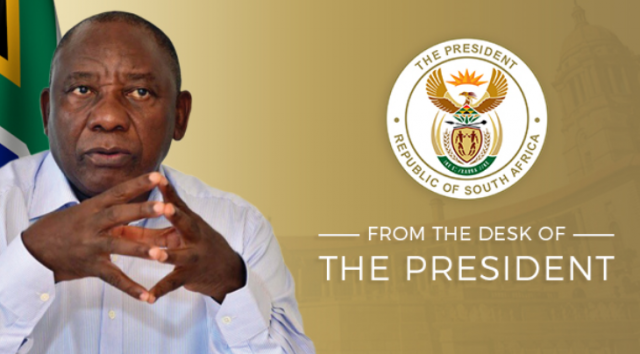Curbing the scourge of Gender-Based Violence (GBV) will require an act of solidary from every sector of society as legislative and policy measures instituted by governments cannot alone rid us of this problem, says President Cyril Ramaphosa.
The President made the clarion call in the latest edition of his weekly newsletter on Monday while reflecting on the upcoming 16 Days of Activism against GBV. The campaign runs from 25 November to 10 December.
He said while it is government that adopts policy, it is the NGOs and community workers who are closest to where people are.
“They are a barometer of implementation on the ground,” he wrote. “This country’s women and children, and indeed all the people of South Africa will forever remain grateful for the work of our robust, activist and principled civil society organisations and workers.”
“Despite the groundswell of public support for this campaign and many others like it, we are still unfortunately a long way from realising a world free of sexism, discrimination and violence against women and girls,” said President Ramaphosa.
“Despite our best efforts as the international community, as national governments and as civil society, gender-based violence remains a feature of the lives of millions of women and girls around the world.”
The 16 Days of Activism campaign, he wrote, affirms the need for all sectors of society to play their part in the fight against gender-based violence.
“It is about driving fundamental change in societal attitudes that allow sexism, chauvinism and patriarchy to thrive,” he said.
As the country gears for this year’s campaign, President Ramaphosa said government acknowledges the invaluable work being done by those outside government to combat gender-based violence.
“I speak here of the volunteers at shelters, at police station victim support offices and rape crisis centres, and who staff victim-support hotlines. We thank the housemothers and managers in our care centres for children, the elderly and other vulnerable groups who have been affected by gender-based violence,” he said.
He said the country was grateful for the dedication of social workers, both in government and in grassroots organisations, who provide critical psycho-social services to survivors and their families.
“We acknowledge the counsellors and sponsors who are a lifeline both for survivors and those perpetrators of gender-based violence whose lives have been ravaged by alcoholism and substance abuse,” he said.
“I commend the professionals who work with perpetrators; running workshops and programmes and supporting efforts towards their rehabilitation and reintegration into society.”
The President also tipped his hat for neighbours who open their homes to vulnerable mothers and children.
“[We salute] the co-worker who accompanies a survivor of violence to the hospital, police station or a shelter; and the friend who does not stand by and watch a woman or a child being abused but intervenes,” he said.
In paying tribute to the health workers, police men and women, prosecutors and judges on the frontline, the President said the public should not forget those whose work is not publicised, but is no less important or impactful.
“Women form the majority of those engaged in care work and it is in the main unpaid. Acknowledging its important contribution not just to the economy but to society, is key to advancing gender equality.
“During the lockdown to contain the COVID-19 pandemic we witnessed first-hand the integral role played by the NGO and community-based sector in providing support to vulnerable women and children,” he said.
“They worked with government to ensure that the basic needs of women and children in shelters were met, and worked with the Solidarity Fund to ensure there was adequate personal protective equipment in shelters where they were needed.”
Beyond its devastating effects on the health, safety and well-being of women and girls, he said the “insidious problem” has significant social, political and economic impacts.
“According to a 2017 study, the economic cost of gender-based violence in South Africa is between R28 billion and R42.4 billion a year. This includes the social services, shelter and health care needed to respond effectively to gender-based violence,” he said.
Individuals and families bear the greatest proportion of costs – from reduced income to replacement of broken property, to transportation to seek care or attend trial.
Furthermore, the productivity of women in abusive relationships is also negatively affected.
He added that there is also the so-called second-generation impact, such as the cost of services for children and others who are affected.
“It is clear then that not only is eradicating gender-based violence a moral and human rights imperative, it is also key to us realising our developmental potential as a country,” he said.
“As we begin the 16 Days of Activism campaign on Wednesday, he urged the public to remember that they all share the common goal of turning the tide on the scourge.” – SAnews.gov.za

